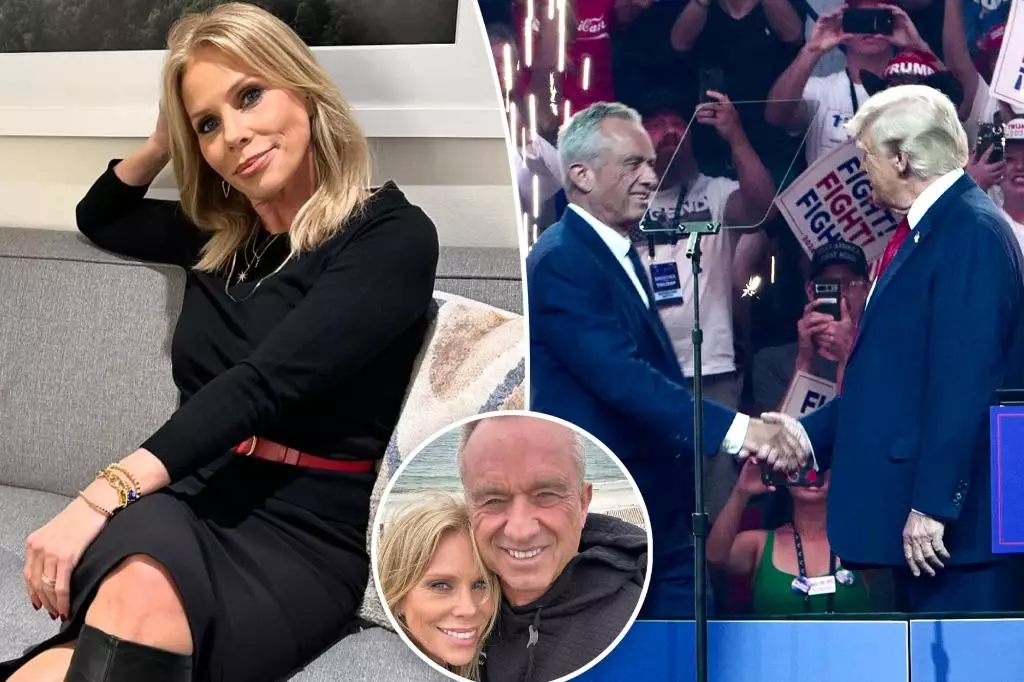The current landscape of celebrity relationships often reflects a complex interplay of personal emotions and public personas. The potential separation between Cheryl Hines and Robert F. Kennedy Jr. is a case study in how fame, political affiliations, and personal integrity intersect. Sources suggest that their marital woes stem more from political disagreements—specifically, Kennedy’s relationship with Donald Trump—than the alleged affair with journalist Olivia Nuzzi. The intricate dynamics at play within this narrative underscore the challenges faced when individual beliefs clash with familial and societal expectations.
Cheryl Hines, known for her role in “Curb Your Enthusiasm,” reportedly feels blindsided by her husband’s foray into the Trump-supporting sphere. While infidelity naturally raises red flags in any relationship, Hines’ discontent appears to be fueled more by Kennedy’s political pivot than his rumored dalliances. This detail is particularly striking, as it reveals how entwined modern relationships can be with broader political contexts, particularly when one partner’s public actions could alienate loved ones.
Sources indicate that Hines is a lifelong Democrat, and the implications of her husband endorsing a candidate like Trump—a figure she visibly opposes—may be a significant mental weight for her. Kennedy’s shifting political affiliations could be interpreted as a betrayal not merely of her trust but of their shared values. This situation highlights an evolving truth in contemporary partnerships: compatibility extends beyond personal love into the realm of ideological alignment.
While Hines knew of Kennedy’s historical challenges with fidelity before their marriage, the current circumstances seem uniquely distressing. According to writer Jerry Oppenheimer, she’s been particularly hurt and embarrassed by the allegations of a romantic relationship between Kennedy and Nuzzi, who is 31 years old. The idea that Kennedy could engage in another affair, despite past experiences, raises unsettling questions about commitment and trust within the marriage.
In an attempt to acknowledge the complexity of relationships involving individuals with notorious reputations—like the Kennedys—it becomes essential to consider how patterns of behavior develop over time. Although Hines might have expected some level of infidelity given Kennedy’s lineage, the expectation of reform typically surfaces in relationships. The fact that she believed Kennedy could turn the corner implies a substantial emotional investment, making the current situation all the more painful for her.
Their marital discord has gained traction in tabloid media, with sources feverishly dissecting the nuances of their relationship. Public interest in the couple continues to amplify the scrutiny Hines faces, making it challenging for her to navigate her emotions privately. The presence of gossip surrounding her discomfort with Kennedy’s dealings in the Republican sphere adds to the burden of her perceived failures.
It is important to assess how public perception can affect personal lives, particularly for individuals like Hines who are thrust into the spotlight. Her response to the rumors and the visible display of her wedding ring—or lack thereof—becomes a performance subject to public interpretation, reflecting the conflation of personal and public life in the celebrity realm.
As developments unfold, it remains unclear whether Hines will ultimately choose to separate from Kennedy. While it seems she is indeed considering this option, the emotional and social ramifications of such a decision cannot be underestimated. If she were to leave him, the move would not only represent a personal choice but also a broader message about individual empowerment, particularly regarding political identity and personal integrity.
Kennedy’s current connections and political aspirations might complicate Hines’ future decisions. The prospect of his involvement in a potential Trump administration raises additional questions about the dynamics of their relationship in highly charged political environments. Hines’ internal struggle—between love for Kennedy and her conflicting political beliefs—exemplifies a reality faced by many in similarly intertwined personal and public lives.
Ultimately, the saga of Cheryl Hines and Robert F. Kennedy Jr. serves as a poignant reminder that relationships are rarely straightforward. The intersection of love, betrayal, and political allegiance continues to craft narratives that are both universal and uniquely tied to the individuals involved. As public figures, their journey will undoubtedly remain under the microscope, but at its core lies a deeply human struggle for connection amidst the chaos of fame and ideology.

